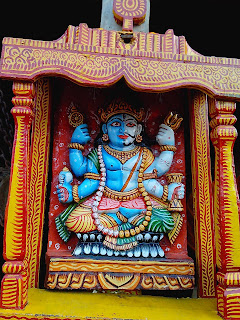Oneness of Lord Shiva and Lord Vishnu
Since the origin of
the Vaishnava and Shaiva cult, there have been differences between these two
regarding the supremacy of one over the other. It was even instructed to followers
of both the sects that –
Even if they are
chased by a tiger, they should not take shelter in the temple of the opposite
sect.
But the scriptures
say that Shiva and Vishnu cannot be differentiated; as in essence they are the
same. Let’s see what the scriptures tell about the oneness of these two Gods.
Shiva Purana states –
1. Vishnu resides
in my (Shiva’s) heart and I (Shiva) reside in Vishnu’s heart. He, who does not
differentiate us (Shiva and Vishnu), is especially liked by me (Shiva).
2. He, who takes
refuge in You (Vishnu), definitely takes refuge in me (Shiva) also. He, who
differentiates us (Shiva & Vishnu), goes to hell for sure.
3. He, who
disapproves of You (Shiva) being my (Vishnu’s) devotee, should surely be sent
to hell by You (Shiva). He, who is Your (Shiva’s) devotee, is extremely dear to
me. Moksha or liberation is not unattainable for him who knows this truth.
4. O Hari! He, who
has hatred for you, will definitely be punished by Me (Shiva). O Vishnu! I will
give salvation to your devotees.
Padma Purana states –
Shiva says “O
Narayana! Can anybody be dearer to Me (Shiva) than You (Vishnu)? What to tell
of others; even Parvati is not equally dear to me like You (Vishnu).”
Narad Pancharatra states –
‘Shiva is Hari and
Hari is none other than Shiva. An enemy of Shiva is an enemy of Hari, even
though he may daily worship Vishnu.’
Sri Hari-Bhakti-Vilasa states –
He, who
differentiates between the names and attributes of Shiva and Vishnu, commits
the offence of Hari Nama Aparadha.
Vayu Purana states –
Shiva says “O
Vishnu! O Eternal Deva! The entire
visible universe consisting of manifested, un-manifested, animate and inanimate
things are Rudra-Narayanatmaka
(Shiva-Vishnu in nature). I am Agni
and You are Soma, I am day and You
are night, I am Truth and You are the cosmic order, You are Yajna (Sacrifice) and I am its fruit,
You are knowledge and I am to be known. After pleasing You, devotees are able
to enter into Myself. You are Prakriti
(Nature) and I am Purusha (Primordial
Male Entity), You are half of my body and I am also half of Yours, I am your
left half and you are my right half (that’s why people call me Neela-Lohita). You are my heart and I
reside in your heart.”
Brahma Vaivarta Purana states –
Vishnu says “Nobody
is dearer to me than You (Shiva). What to tell more; You (Shiva) are my real
nature (Atma-Swaroop). The fools who
disapprove You (Shiva) are sinners. They will be tied with the ‘Kaal-Paash’ (Time noose) and suffer as
long as the Sun and the Moon exist.”
Skanda Purana states –
He, who is Rudra (Shiva),
is also Vishnu and He, who is Vishnu is also Mahesvara (Shiva). The unique
relation existing between these two Gods is like the unique relation between Vayu (air) and Akash (Ether or Sky). There is no difference between these two
Gods.
Vishnu is pleased with
him, who has worshipped Shiva. Vishnu does not accept puja from a person if he has
not offered puja to Shiva first. That’s why by all means one should worship
Shiva so that his worship of Vishnu finds completeness.
Varaha Purana states –
Lakshmi is
identical with Girija (Parvati) and Hari (Vishnu) is identical with Shiva. It
is so declared in the Shastras and Puranas. Any Shastra/Kavya which states otherwise is not worthy of its name. He who
speaks of difference between them is lowly (Adhama)
and should be considered an atheist outside the field of “Dharma".
Ram Charit Manas states –
Sankar priya mama
drohi siva drohi mama daas |
Te nar karahin
kalap bhari ghor narak mahu baas || (Manas, Lanka, 2/4/2)
Translation - Lord
Rama (Incarnation of Vishnu) says “he, who is fond of Shiva but has hatred towards
me and he, who is my devotee but has hatred towards Shiva, will dwell in hell
for ages."
So it is to be
understood that Shiva and Vishnu are dear to each other. Though they are
different as per the duties assigned to them in the cosmic order, in essence
there is no difference between them. To highlight this truth they are worshiped
as Harihara. Harihara is the name of a combined deity form of both Vishnu
(Hari) and Shiva (Hara). Also known as Shankaranarayana ("Shankara"
is Shiva, and "Narayana" is Vishnu), Harihara is thus worshiped by
both Vaishnavites and Shaivites as a form of the Supreme God.
At last I conclude
with this popular verse commonly uttered in prayers. It states –
शिवाय विष्णुरूपाय शिवरूपाय विष्णवे ।
शिवस्य हृदयं विष्णु: विष्णोश्च हृदयं शिव: ॥
Shivaaya
vishnurupaya shivarupaya vishnave |
Shivasya hridayam
vishnuh vishnoshcha hridayam shivah ||
[(obeisance to)
Lord Shiva who is of the form of Lord Vishnu and to Lord Vishnu who is of the
form of Lord Shiva. Shiva’s heart is Vishnu and Vishnu’s heart (essence) is
Shiva.]

Thank You So much !
ReplyDeleteThe one ness of Shiva and Vishnu is well narrated.
ReplyDeleteHari Bhaktas who hate Shiva or Shiva Bhaktas who hate Vishnu should be ashamed of themselves.